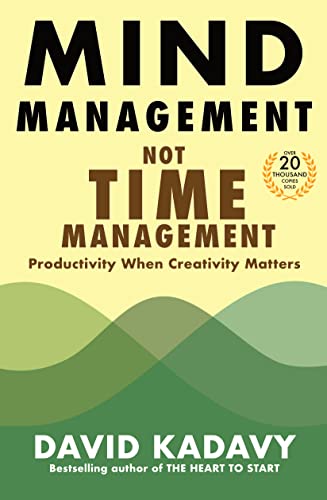INSIDER: Mind Management, Not Time Management
Carson Solley, MBA Candidate
We live in a fast-paced and constantly changing world. Most people have hundreds of things to accomplish in a short, 24-hour window before they must do it all over again. In his book, Mind Management, Not Time Management, David Kadavy proposes a new approach to productivity that encourages success by focusing on managing one’s mind rather than managing one’s time. Kadavy argues that traditional time management techniques are no longer effective in today's fast-paced world and that people must learn to manage their minds in order to achieve their goals.
THINK POINT #1: Time Management is a Flawed Concept
Kadavy argues that time management is a flawed and fixed concept and that time cannot be managed. He explains that individuals essentially waste the time they are trying to manage by creating schedules and to-do lists. When we try to manage our time, we simply try to accomplish as much as possible. This means we fail to prioritize, which causes problems when actually trying to accomplish goals. Kadavy argues that many times people waste time on what they think are urgent tasks, while time could be better spent on more important tasks. When individuals try to manage time effectively, they cram different tasks into an agenda, not accounting for external factors that may shift one’s entire day’s plan off track. If we manage our minds rather than just our time, we can be more effective and productive throughout the day and throughout the lifecycle of a project or task.
THINK POINT #2: Managing Your Mind for Creativity
To be creative, you must be able to manage your mind rather than just your time. Creativity requires space and time for exploration, and traditional time management techniques can hinder this process by creating a rigid structure that does not allow for spontaneity or experimentation. Kadavy emphasizes the importance of managing the mind in order to be productive in a creative space. Managing the mind involves developing the ability to control one’s thoughts and emotions, which can help maintain focus and motivation in the face of creative challenges. Kadavy notes that creativity often involves a process of trial and error and that failure is a necessary part of this process. Therefore, managing your mind also involves developing resilience and the ability to learn from past mistakes.
THINK POINT #3: Pay Attention to Physical and Emotional Well-Being
Kadavy also explains the importance of managing physical and emotional well-being. When at your physical and emotional peak, you are also peaking in creative areas. Sleep, diet, and exercise can have direct impact on your mind, which can either lead to enhanced creativity or can be detrimental to the creative process. When you emphasize the importance of managing physical and emotional health, you are also directly emphasizing health of the mind. These factors can affect both productivity and creativity.
Practical Applications
Managing your mind is a shift in the traditional perspective of managing your time. People are often so focused on getting tasks done that they forget the goals they are actually trying to achieve. Kadavy gives practical applications throughout his book to encourage mind management in order to achieve productivity in a creative space:
- Embrace uncertainty: To be creative, you must embrace uncertainty and take risks, as creativity is a constant changing flow of ideas. This allows you to free yourself from the fear of failure and allow yourself to take creative risks.
- Create curiosity: Curiosity is key when it comes to creativity. To be creative, you must explore new ideas that may lead to creative breakthroughs.
- Enjoy the process: Creativity takes time. When you focus on the process rather than the result, you can free yourself from walls that you create and enjoy the creative journey.
- Rest: Relaxation is essential in the creative process. When you rest and engage in activities that you enjoy, you are charging your creative batteries. Once you have rested, you can then begin to work on creative work again with a newfound energy.
Kadavy emphasizes the importance of managing your mind and your mental health. He argues time and time again that in order to be productive and successful, you must not simply have a task-oriented mindset but a mindfulness of your mind.
. . . . . . . . . . . . . . . . . . .
Recommended Reading
Kadavy, David (2020), Mind Management, Not Time Management, Kadavy, Inc.
. . . . . . . . . . . . . . . . . . .
About the Authors
Carson Solley, MBA Candidate
Baylor University
Carson Solley is a graduate student from Decatur, Alabama. Carson earned a Bachelor of Science in Business Administration from Samford University in Birmingham, Alabama. While at Samford, Carson concentrated in data analytics and sports marketing. Carson was the Team Lead for two projects with the New Orleans Saints and interned with the Birmingham Legion and the Alabama Sports Hall of Fame. After receiving his MBA, Carson plans to work in finance.
